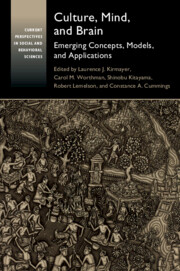Book contents
- Culture, Mind, and Brain
- Current Perspectives in Social and Behavioral Sciences
- Culture, Mind, and Brain
- Copyright page
- Dedication
- Epigraph
- Contents
- Figures
- Tables
- Contributors
- Preface
- Abbreviations
- 1 Introduction
- Part I Dynamics of Culture, Mind, and Brain
- Part II Applications
- 12 The Cultural Brain as Historical Artifact
- 13 Experience-Dependent Plasticity in the Hippocampus
- 14 Liminal Brains in Uncertain Futures
- 15 The Reward of Musical Emotions and Expectations
- 16 Literary Analysis and Weak Theories
- 17 Capturing Context Is Not Enough
- 18 Social Neuroscience in Global Mental Health
- 19 Cities, Psychosis, and Social Defeat
- 20 Internet Sociality
- 21 Neurodiversity as a Conceptual Lens and Topic of Cross-Cultural Study
- 22 Epilogue
- Index
- References
15 - The Reward of Musical Emotions and Expectations
from Part II - Applications
Published online by Cambridge University Press: 18 September 2020
- Culture, Mind, and Brain
- Current Perspectives in Social and Behavioral Sciences
- Culture, Mind, and Brain
- Copyright page
- Dedication
- Epigraph
- Contents
- Figures
- Tables
- Contributors
- Preface
- Abbreviations
- 1 Introduction
- Part I Dynamics of Culture, Mind, and Brain
- Part II Applications
- 12 The Cultural Brain as Historical Artifact
- 13 Experience-Dependent Plasticity in the Hippocampus
- 14 Liminal Brains in Uncertain Futures
- 15 The Reward of Musical Emotions and Expectations
- 16 Literary Analysis and Weak Theories
- 17 Capturing Context Is Not Enough
- 18 Social Neuroscience in Global Mental Health
- 19 Cities, Psychosis, and Social Defeat
- 20 Internet Sociality
- 21 Neurodiversity as a Conceptual Lens and Topic of Cross-Cultural Study
- 22 Epilogue
- Index
- References
Summary
Music exists in all cultures and appears to elicit intense emotions and pleasure in the vast majority of people. Recent scientific advances have linked the pleasure of music listening to biological mechanisms associated with rewarding or reinforcing stimuli, including the activation of the brain’s reward system. Specifically, we and others have shown that the neurotransmitter dopamine is central to this phenomenon, and that it engages one subregion of the reward system in anticipation of pleasurable musical events and another during its realization. This dissociation implies that musical pleasure operates via some predictive mechanism that creates expectations, which the music then either fulfills or not. Accordingly, a growing body of evidence highlights the prevalence of prediction-based neural processing and its importance for learning about and adapting to one’s environment. Drawing on these findings and on related research into the optimization of learning, we propose that musical structures recruit neural systems of reward and emotion by evoking sufficiently uncertain expectations to build anticipation, and sufficiently surprising events to foster learning, reward, and pleasure. We explore the role that musical experience and culture play in engendering expectations, and offer suggestions for future research into the neuroscience of musical aesthetics and reward.
- Type
- Chapter
- Information
- Culture, Mind, and BrainEmerging Concepts, Models, and Applications, pp. 402 - 415Publisher: Cambridge University PressPrint publication year: 2020

